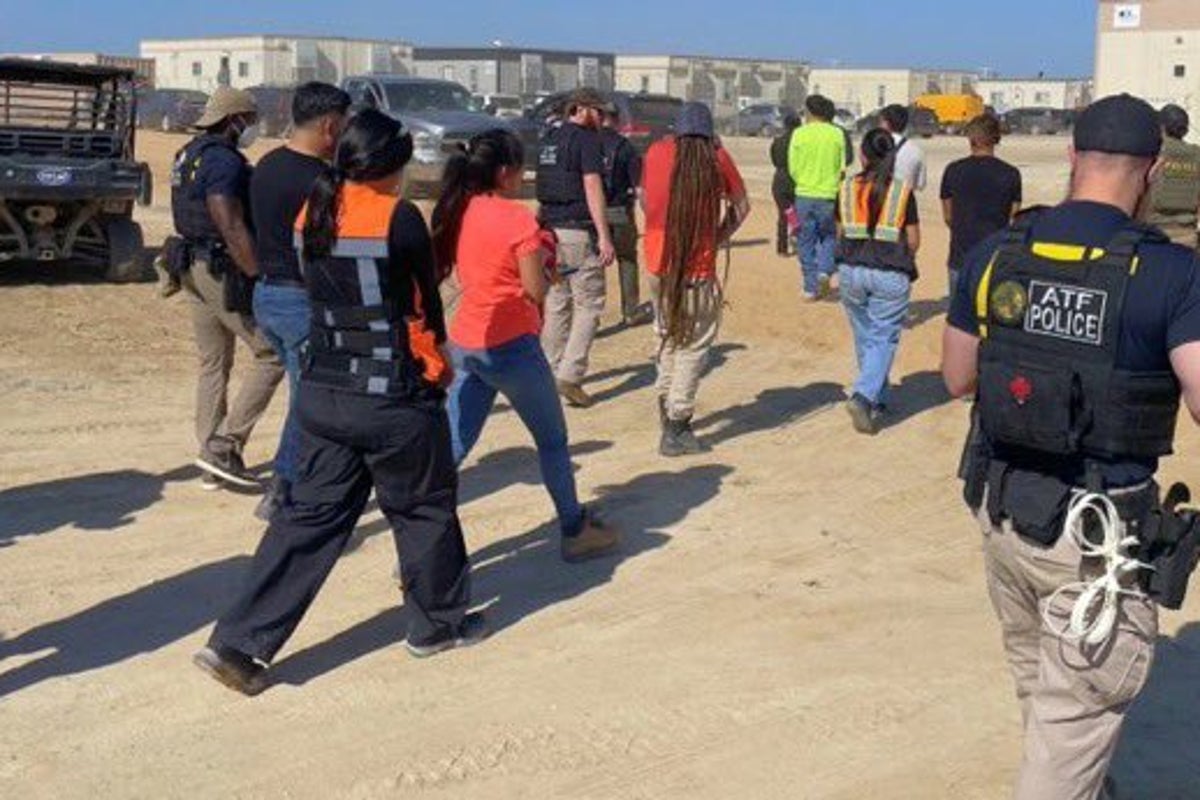Federal immigration authorities say they arrested dozens of South Korean workers at a Hyundai plant in Georgia, marking what the Department of Homeland Security is calling its largest-ever raid — and triggering outrage from South Korean officials who expressed “concern and regret” over the operation.
But a search warrant seen by The Independent shows that agents were seeking the arrests of only four workers at the facility — who are Latino.
Agents arrested 475 people on Thursday at a battery facility on the sprawling Hyundai campus in Ellabell, Georgia — roughly 30 miles west of Savannah — as part of an “ongoing criminal investigation into allegations of unlawful employment practices and other serious federal crimes,” according to Homeland Security.
A judge approved the warrant following a months-long investigation, according to Steve Schrank, a special agent in charge of Homeland Securities Investigations Atlanta. Schrank hailed the arrests as “the largest single-site enforcement operation” in the history of the agency.
“This was not an immigration operation where agents went into the premises, rounded up folks and put them on buses,” he said during a press conference Friday.
No criminal charges were announced, but Schrank said many of the factory’s workers were living and working in the United States without legal permission.
The massive operation targeted a sprawling, 3,000-acre complex in a state under Republican leadership, which has hailed the $7.6 billion Hyundai Motor Group investment as one of the state’s largest economic development projects in its history.
South Korea’s biggest automaker began manufacturing electric vehicles at the plant last year, which employs more than 1,000 people. LG Energy Solution operates an adjacent battery plant set to open next year.
But Donald Trump’s administration did not appear to give its key ally any advance notice of the operation, which caught Seoul by surprise.
The country’s foreign ministry spokesperson Lee Jaewoong expressed “concerns and regret” following news of the arrests and urged “special attention to ensure that the legitimate rights and interests of our citizens are not violated.”
“The economic activities of Korean investment companies and the rights and interests of Korean citizens must not be unfairly infringed upon during U.S. law enforcement operations,” the ministry said following news of the arrests.
In a statement, Hyundai said the company is “closely monitoring the situation and working to understand the specific circumstances.”
“As of today, it is our understanding that none of those detained is directly employed by Hyundai Motor Company,” the company said.
With a directive from the White House to make thousands of daily arrests, Immigration and Customs Enforcement has received record-breaking funding from Congress — expanding the agency’s budget to be larger than most countries’ militaries — to hire more officers and expand detention space.
The Trump administration has deployed federal agents across the country to support his aggressive mass deportation agenda with large-scale arrests and sweeps targeting major Democratic-led cities with large immigrant populations. A record 60,000 people are currently locked up in immigration detention centers across the country.
The administration has directed all federal law enforcement agencies to converge around immigration enforcement, drawing warnings from immigration attorneys and advocates that those arrest quotas will almost certainly include “collateral” arrests of citizens and others with lawful immigration status.
The country’s labor force lost more than 1.2 million immigrants within the first seven months of the year, including people who are in the country without legal permission, according to an analysis of preliminary Census Bureau data from the Pew Research Center.
That massive reduction has affected industries with large populations of foreign-born workers, including farming, construction and home healthcare.
Roughly 92 percent of construction companies reported project delays due to workforce shortages, according to the Bureau of Labor Statistics.

